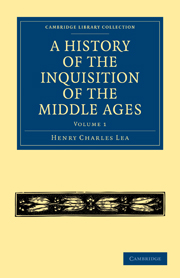Book contents
- Frontmatter
- PREFACE
- Contents
- BOOK I—ORIGIN AND ORGANIZATION OF THE INQUISITION
- CHAPTER I THE CHURCH
- CHAPTER II HERESY
- CHAPTER III THE CATHARI
- CHAPTER IV THE ALBIGENSIAN CRUSADES
- CHAPTER V PERSECUTION
- CHAPTER VI THE MENDICANT ORDERS
- CHAPTER VII THE INQUISITION FOUNDED
- CHAPTER VIII ORGANIZATION
- CHAPTER IX THE INQUISITORIAL PROCESS
- CHAPTER X EVIDENCE
- CHAPTER XI THE DEFENCE
- CHAPTER XII THE SENTENCE
- CHAPTER XIII CONFISCATION
- CHAPTER XIV THE STAKE
- APPENDIX
CHAPTER XIV - THE STAKE
Published online by Cambridge University Press: 29 August 2010
- Frontmatter
- PREFACE
- Contents
- BOOK I—ORIGIN AND ORGANIZATION OF THE INQUISITION
- CHAPTER I THE CHURCH
- CHAPTER II HERESY
- CHAPTER III THE CATHARI
- CHAPTER IV THE ALBIGENSIAN CRUSADES
- CHAPTER V PERSECUTION
- CHAPTER VI THE MENDICANT ORDERS
- CHAPTER VII THE INQUISITION FOUNDED
- CHAPTER VIII ORGANIZATION
- CHAPTER IX THE INQUISITORIAL PROCESS
- CHAPTER X EVIDENCE
- CHAPTER XI THE DEFENCE
- CHAPTER XII THE SENTENCE
- CHAPTER XIII CONFISCATION
- CHAPTER XIV THE STAKE
- APPENDIX
Summary
Like confiscation, the death-penalty was a matter with which the Inquisition had theoretically no concern. It exhausted every effort to bring the heretic back to the bosom of the Church. If he proved obdurate, or if his conversion was evidently feigned, it could do no more. As a non-Catholic, he was no longer amenable to the spiritual jurisdiction of a Church which he did not recognize, and all that it could do was to declare him a heretic and withdraw its protection. In the earlier periods the sentence thus is simply a condemnation as a heretic, accompanied by excommunication, or it merely states that the offender is no longer considered as subject to the jurisdiction of the Church. Sometimes there is the addition that he is abandoned to secular judgment—“relaxed,” according to the terrible euphemism which assumed that he was simply discharged from custody. When the formulas had become more perfected there is frequently the explanatory remark that the Church has nothing left to do to him for his demerits; and the relinquishment to the secular arm is accompanied with the significant addition “debita animadversione puniendum” — that he is to be duly punished by it. The adjuration that this punishment, in accordance with the canonical sanctions, shall not imperil life or limb, or shall not cause death or effusion of blood, does not appear in the earlier sentences, and was not universal even at a later period.
- Type
- Chapter
- Information
- A History of the Inquisition of the Middle Ages , pp. 534 - 562Publisher: Cambridge University PressPrint publication year: 2010First published in: 1888

